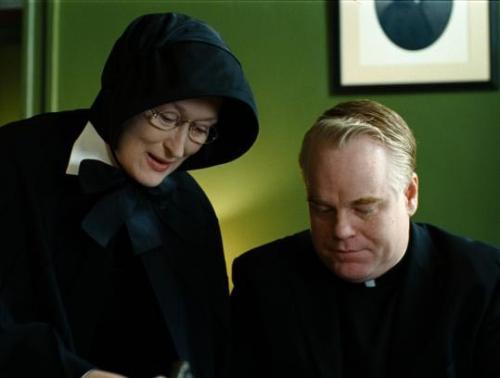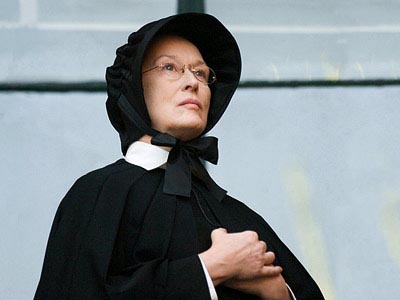Doubt | Streep and Hoffman go head to head

Acting heavyweights Meryl Streep and Philip Seymour Hoffman go head to head in this self-important drama about the battle of wills between a nun and a priest at a parochial school in New York’s Bronx in 1964. Hollywood has been duly impressed: they’ve both been nominated for Oscars for their performances. It’s a duel of equals, which makes it all the more puzzling that Streep has been nominated as best actress, while Hoffman’s role has been consigned to the best supporting actor category.
But then Doubt is a puzzling film. Written and directed by John Patrick Shanley (an Oscar-winner himself for his Moonstruck script), it’s based on Shanley’s own stage play – a Pulitzer prizewinner on Broadway but less fulsomely acclaimed when it played at the Tricycle in London – and deals, as the title suggests, with questions of faith and uncertainty.
Tipped off by Amy Adams’ naïve junior nun, Streep’s Sister Aloysius, the feared authoritarian principal of St Nicholas’s school, suspects that Hoffman’s charismatic liberal priest, Father Flynn, is conducting an improper relationship with the school’s sole black pupil. With nothing to go on but her own sense of moral certainty, she resolves to get Flynn removed from the school but finds the all-male hierarchy of the Catholic Church blocking her progress.

As the drama unfolds, Shanley self-consciously piles up the moral ambiguities. Every character quirk or plot kink is set up to tease the viewer’s expectations, preconceptions and prejudices. Sister Aloysius is rigid and reactionary: she disapproves of ballpoint pens, long fingernails and ‘Frosty the Snowman’ (“heretical”). Father Flynn is relaxed and kindly, a representative of the new mood of compassion and tolerance brought into the Catholic Church by the Second Vatican Council begun in 1962 by Pope John XXIII. But he may also be a paedophile.
Shanley then throws another moral curveball into the drama, complicating our response still further. Sister Aloysius summons to the school the mother (Viola Davis) of the pupil who may or may not have been abused. She, however, is only concerned with getting her son through the year to graduation. Indeed, she welcomes the priest’s kindness to her son and is quite willing to turn a blind eye if need be.
On stage, it was possible to turn a blind eye to the play’s shortcomings and be gripped by the drama, yet on screen Doubt comprehensively fails to work. Not that Shanley doesn't try his darnedest. He strains to open things up, piling on the period detail, tilting his camera this way and that, even going to the extent of whipping up a symbolic storm, but the end result couldn’t feel stagier. Even more unfortunately, his attempts to be cinematic drain the tension from the encounters between Streep and Hoffman – unlike Ron Howard, who succeeded in making Peter Morgan’s theatre work Frost/Nixon even more intense on screen.
Despite all this, Doubt has been rewarded with five Oscar nominations: for Streep, Hoffman, Adams, Davis and Shanley's script. Streep could well win, but if she does it will be a travesty. Her fussy, finicky performance, with all its insufferably mannered physical and vocal tics, is sheer camp. No, the performance that deserves an Oscar is that by Davis as the working class mother. She only appears on screen for a few minutes but, unlike Streep, she gets right inside her character and conveys an entire life history of struggle and resilience. Does she blow Streep off screen? Of that there is no doubt. (General release from 6th February)
The latest updates, reviews and unmissable series to watch and more!
A film critic for over 25 years, Jason admits the job can occasionally be glamorous – sitting on a film festival jury in Portugal; hanging out with Baz Luhrmann at the Chateau Marmont; chatting with Sigourney Weaver about The Archers – but he mostly spends his time in darkened rooms watching films. He’s also written theatre and opera reviews, two guide books on Rome, and competed in a race for Yachting World, whose great wheeze it was to send a seasick film critic to write about his time on the ocean waves. But Jason is happiest on dry land with a classic screwball comedy or Hitchcock thriller.


